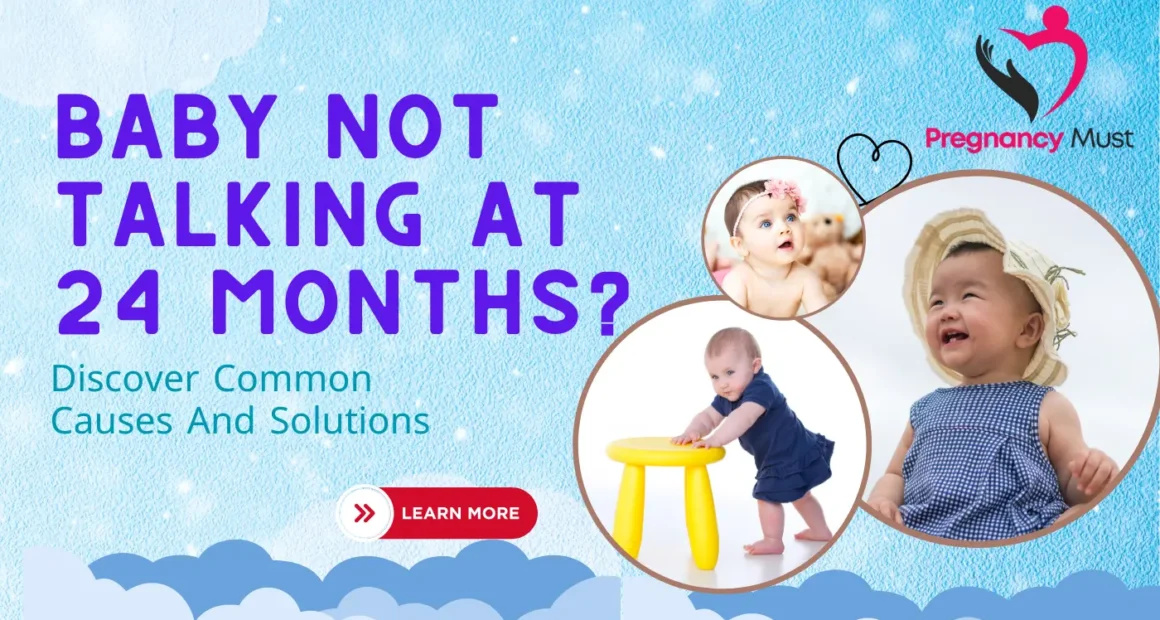If your baby not talking at 24 months, it is obviously concerning as most children start making simple sentences at the age of 24 months. Awareness of the potential causes and knowing when to seek help can provide clarity and peace of mind. While some delays talking and may catch up without interference. But some need targeted strategies and therapies. Language delay and speech delay are different in addressing the specific requirements.
Table of Contents
Understanding Baby Not Talking at 24 Months: Is It Normal?
Every child develops at their own pace, but if your 2 year old not talking, it might indicate a delay in speech and language development. Some toddlers are simply late bloomers. On the other hand, some need support to bloom. American Speech-Language-Hearing Association mentions, by age two, a toddler should be using at least 50 words and be able to combine words into short phrases. These milestones, if not met yet, it probably an indication of speech delay. In addition, children not talk but are responsive to communication cues need a little more inspiration and well-structured language exposure.
Common Causes of Baby Not Talking at 24 Months But Babbling
If your toddler is not talking at 2 but babbling consistently, the reason may be:
- Hearing Issues: Undiagnosed hearing loss can impact speech development. A hearing test can rule out auditory issues.
- Autism Spectrum Disorder (ASD): One of the symptoms of ASD is speech delay. Babbling or making echo words but facing difficulty with spontaneous communication is common in children with ASD.
- Developmental Delays: Motor skills and speech can be affected by issues like cerebral palsy or global developmental delay.
- Speech Apraxia: This motor speech disorder affects the brain’s ability to coordinate the movements needed for speech. The child may have difficulty forming words but understand language.
- Environmental Factors: Exposure to language may not be enough. For example, screen time over the bar or interaction deficiency can also cause speech delay. Creating a language-rich environment can make a significant difference.
When to Worry If a Baby Not Talking at 24 Months
While some children catch up naturally, seek advice if your baby can’t talk at age 2 and also:
- Doesn’t respond to their name.
- Shows no interest in communicating.
- Doesn’t attempt to mimic words.
- Is unable to follow simple directions.
- Appears frustrated when trying to communicate.
- Displays repetitive behaviors or limited eye contact.
Early intervention can significantly improve outcomes. Speech-language pathologists can assess a child’s abilities and recommend tailored exercises to encourage verbal skills. Additionally, developmental screenings can identify underlying neurological or cognitive delays contributing to speech issues.
Steps to Encourage Speech
If your 2yr old is not talking, consider these strategies:
- Read interactive books daily to introduce new words and encourage repetition. Books with bright pictures and repetitive phrases can be especially effective.
- Encourage them to participate in simple conversations, even if they’re not responsive. Give a narrative description of your actions, and to simulate the use of language, keep questioning.
- Play games that involve naming objects, identifying colors, or imitating animal sounds. Incorporating singing and music can also enhance word learning.
- Limit screen time and encourage face-to-face interactions to foster verbal communication. Excess screen time can lead to speech delay.
- Use gestures and sign language as additional modes of communication. Signing can reduce frustration while the child builds verbal skills.
- Encourage social interactions with peers. Playdates can motivate a child to use language to express needs and desires.
Seeking Professional Help
If your child is still not talking at 24 months, consult a pediatrician or speech therapist. They can assess developmental milestones, evaluate any underlying conditions, and suggest interventions such as speech therapy, occupational therapy, or early intervention programs. These therapies can provide structured guidance to help your child develop language skills effectively.
Additionally, specialists can recommend techniques to practice at home, such as speech exercises, flashcards, and interactive play. The earlier a child receives support, the better the chances of catching up to typical developmental milestones.
Conclusion
While some children may take a bit longer to start talking, persistent delays should not be ignored. Proper monitoring of your child’s speech development helps in seeking early intervention. Parents can play a crucial role in stimulating speech development by engaging in daily interactions, reading books, and encouraging verbal responses. Every effort takes a step forward to deal with or overcome difficulties. Explore our Q&A for helpful tips and essential guidance.









